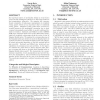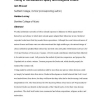16 search results - page 2 / 4 » Social Choice, Merging, and Elections |
IJCAI
2007
15 years 1 months ago
2007
Electoral control refers to attempts by an election’s organizer (“the chair”) to influence the outcome by adding/deleting/partitioning voters or candidates. The groundbreak...
JELIA
2004
Springer
15 years 5 months ago
2004
Springer
Abstract. Results in social choice theory such as the Arrow and GibbardSatterthwaite theorems constrain the existence of rational collective decision making procedures in groups of...
VOTEID
2009
Springer
15 years 6 months ago
2009
Springer
In the Dutch e-voting debate, the crucial issue leading to the abandonment of all electronic voting machines was compromising radiation, or tempest. Other countries, however, do no...
ATAL
2009
Springer
15 years 6 months ago
2009
Springer
An important aspect of mechanism design in social choice protocols and multiagent systems is to discourage insincere and manipulative behaviour. We examine the computational compl...
104
click to vote
MDAI
2007
Springer
15 years 5 months ago
2007
Springer
We take institutions seriously as both a rational response to dilemmas in which agents found themselves and a frame to which later rational agents adapted their behaviour in turn....


